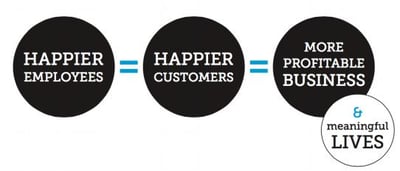.png?width=1024&name=Copy%20of%20First%20Follower%20(1).png)
When will everything return to normal? We impatiently wait and eagerly watch as most businesses begin to re-open. We are so keen to return to the world we knew before COVID-19, but does that world exist anymore?
The short answer is no. The normal we thought we would return to has been replaced with the “new’ normal. As we face an uncertain future, we can easily be overwhelmed with anxiety and fear, which can cause us to lose sight of the positive impacts the shutdown has had on the environment, society, and organizational culture.
The future of work is changing due to the COVID-19 crisis; however, this can be a positive thing for businesses. Here are three ways in which these changes will have a positive impact on your business and your employees.
Dining rooms have become make-shift offices, meetings have moved from conference rooms to virtual chatrooms, and comfy sweats have replaced business casual as the majority of the workforce is working [in some capacity] remotely. Before stay-at-home orders were issued, only about 3% of the US workforce worked remotely. Now that seemingly everyone is experiencing remote work, will it become the new normal for business?
Some predict remote work will increase 25%-30% going into 2021. Twitter was one of the first corporations to announce they are giving their employees the option to continue to permanently work remotely even after business returns to "normal," and many other companies are following their lead.
Benefits to Remote Work:
One survey revealed remote employees work 1.4 more days every month or 16.8 more days every year in comparison to those who work in an office. Imagine what your business can accomplish with an extra 16 days a year!
Free from Workplace Distractions:
Let's face it; no one likes meetings-No one! They tend to be huge time-wasters, and really, couldn't the information be sent via email?! Mark Cuban [Shark Tank star and Business Billionaire] says he refuses to attend a meeting unless he is "picking up a check." We are not Mark Cuban, we have to attend meetings [so we can keep getting a paycheck], and some meetings are necessary to discuss projects, brainstorm ideas, or collaborate on tasks.
Remote work means remote meetings. Make remote meetings a positive, productive experience by:
Another positive impact of remote work is the reduction of office Interruptions. Remote work allows employees to turn off email notifications, silence phones, and dive into the task at hand. Tuning out interruptions is much more difficult in an office environment with the hum of equipment, the constant ringing of phones, and conversations filling the room.
Keeping the Balance in Remote Workplaces [i.e., your home]
Work-life balance is always a hot topic, especially for remote workers. [Here is a little secret: work-life balance is a farce that has been propagated, but I will save that for another time.] Working from home makes it much easier to ignore the clock, finish just one more task, answer only one more email or log in on the weekend only to end up spending hours working. Remote work indeed requires organization and time management, but since the shutdown, everyone has had to adapt and gain these vital skills quickly.
We have all learned how to:
We all have been forced to learn to manage all aspects of life from the confines of our homes. The opportunity for permanent remote work will give your employees the flexibility to maintain their careers while still caring for themselves and their families. It also gives you, the employer, a sense of relief knowing your employees are capable of getting the work done no matter their physical location. This will create a culture of happiness and contentment within your organization.

Before the shutdown, huge corporations inhabited thousands of square footage in Manhattan’s business district. With most business offices sitting nearly [if not completely] empty, many are reconsidering the necessity of physical office space. Paying rent on empty offices has caused many businesses to ask: “If work is getting done remotely, why are we putting so much money into a physical office space?”
Here is a little math to consider: the average cost of office space in New York City is $53.00 per square foot. The suggested square footage per employee is 150 sq.ft, so New York businesses are spending nearly $8,000 a month per employee just for office space. Whether you have tens, hundreds, thousands, or tens of thousands of employees, reducing your monthly rental costs can result in massive savings which can be invested into something more profitable-more sustainable-a more productive investment, such as employees.
The focus on emotional health, wellness, and more supportive leadership are by far [in my humble opinion] the most positive impact of the COVID-19 crisis. Organizational culture matters now more than ever.
According to a study conducted by Glassdoor.com, the #1 factor that impacts employee turnover is culture. When your organization centers the culture around happiness, sales and profits can see huge increases.
The science of happiness is at the core of any robust and well-defined organizational culture.
The science of happiness incorporates the following values:
Delivering happiness believes happiness should be the cornerstone of any company’s culture. An organization that makes happiness an integral part of their culture increases productivity, aligns teams, increases retention while growing the bottom line and sales.

Amanda is the Growth Content Driver at DH. She has been writing and creating engaging content for nearly five years. She loves to use words to inspire and connect with people. Amanda thrives on helping and serving others through the power of the written word. She is always on the search for new and inventive ways to reach and educate others.